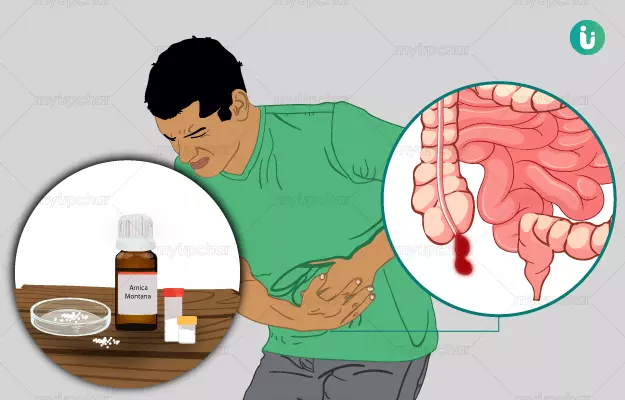Appendix is a tiny organ attached to a small portion of large intestine called caecum and situated in the right side of lower abdomen. It is a vestigial organ with no known function.
Inflammation of the appendix or appendicitis usually results from infection, blockage in the opening of appendix where it attaches to caecum or an abdominal injury. Acute appendicitis presents with sudden onset of severe pain near belly button, which extends to the right side or to the lower abdomen and worsens with movement, coughing, sneezing and deep breaths. The intensity of this pain increases over time.
Appendicitis is a medical emergency that requires immediate attention due to the risk of life-threatening complications, such as bursting of appendix, pus collection in the appendix and gangrene. Homeopathy helps in the treatment of subacute (moderately acute) and chronic cases of appendicitis. Research studies show that homeopathy is also effective in cases of acute appendicitis and can prevent surgery. Homeopathy triggers body’s immune system, which consequently helps in reducing inflammation in appendix.
Different homeopathic medicines used in the treatment of appendicitis include bryonia, rhus toxicodendron, colocynth, arnica, belladonna, hepar sulph, apis mellifica, ignatia, silicea and phosphorus.
- Homeopathic medicines for appendicitis
- Dietary and lifestyle changes for appendicitis patient as per homeopathy
- How effective are homeopathic medicines and treatments for appendicitis
- Side effects and risks of homeopathic medicine and treatments for appendicitis
- Takeaway
Homeopathic medicines for appendicitis
Various constitutional homeopathic medicines that are used in the treatment of appendicitis are listed below. A qualified homeopathic practitioner will select the most appropriate remedy based on your symptoms and mental state.
- Bryonia Alb
Common name: Wild hops
Symptoms: Bryonia is best suited to people who are dark in complexion, nervous and get irritated easily. They have strong muscles and extreme dryness in body. Patients who benefit from bryonia experience the following symptoms:- Severe stitching abdominal pain during appendicitis
- Colicky abdominal pain aggravated by the slightest motion such as coughing, sneezing or breathing
- Desire to remain totally still
- Abdomen sensitive to touch
- Distended abdomen due to formation of gas during appendicitis
- Sticking type of pain in the right side of abdomen associated with throbbing sensation
- Severe abdominal pain during an acute attack of appendicitis, forcing the patient to bend double
- Pain improves after passing light-coloured stools
- Abdominal pain during appendicitis reduces on application of pressure
- Constipation with passage of hard and dry stools in some cases
In a case report, bryonia alba was reported to be beneficial in the treatment of acute appendicitis eliminating the need for surgical removal of appendix. A homeopathic physician in Mumbai also reported a successfully treated case of acute appendicitis with bryonia alb.
- Lycopodium Clavatum
Common name: Club moss
Symptoms: This medicine is best suited to people who are intelligent but physically weak. People who are prone to gastric troubles with a tendency to formation of gas respond well to this remedy. Club moss is used for the treatment of chronic, subacute and acute cases of appendicitis. Patients who respond to this remedy have the following symptoms:- Cutting type of pain in the appendix area
- Right-sided abdominal pain that radiates to the left
- Sensation of chilliness and vomiting
- Abdomen is sensitive to touch
- Appendicitis associated with rumbling sounds from stomach with formation of gas
- Desire to drink hot water during pain
- Pain in the appendix region relieved by applying something warm to the area
Clinical studies show the usefulness of lycopodium in the treatment of acute appendicitis in children.
- Arnica Montana
Common name: Leopard’s bane
Symptoms: This medicine is used in the treatment of appendicitis caused due to an injury to the abdomen. Patients who respond to this remedy have the following symptoms:- Severe right-sided abdominal pain with a cutting sensation in the wound
- Pain increases with the slightest pressure and touch
- Hardness and swelling in the area of appendix with intense pain during an acute attack of appendicitis
- Right-sided abdominal pain which improves better after passing gas (flatus)
- Frequent need to pass stools due to gaseous distension of abdomen
- Pain reduces on lying down with head in a low position
In a case study, arnica montana was reported to be effective in reducing appendix inflammation and preventing surgery.
- Rhus Toxicodendron
Common name: Poison ivy
Symptoms: This remedy is best suited to people who are prone to suffer from rheumatism or hereditary autoimmune disorders related to bones and muscles. They have a tendency to fall sick on getting wet, especially if they have been in direct contact with heat. This medicine is used in cases of chronic appendicitis and after injuries such as fall or strain. Patients who benefit from this remedy have the following symptoms:- Extreme restlessness due to abdominal pain, with an inability to stay still in one place
- Anxiety
- The person fears that he has been poisoned and will die of it
- Pain aggravated by lying down and in sitting position
- Pain relieved by gentle movements like walking slowly and by sleeping or lying down on a hard surface
- Sensitivity to cold air during an acute attack of appendicitis
Animal studies demonstrate the anti-inflammatory effects of rhus toxicodendron. Thus, it may be effective in providing relief from appendicitis symptoms such as swelling and pain.
Further studies indicate that rhus toxicodendron can regulate immune function, which is conducive to a reduction in inflammatory swellings in case of appendicitis.
- Belladonna
Common name: Deadly nightshade
Symptoms: Belladonna acts best in cases where symptoms appear due to a previous injury. This medicine is used in the treatment of acute appendicitis, especially due to infection. People who benefit from this remedy have the following symptoms:- Severe burning and throbbing pain in the area of appendix
- Cutting type of pain in abdomen, which feels as if abdomen is gripped by a claw
- Pain improves after pressing the abdomen hard and bending forward
- Contraction of abdominal muscles that are present right below the ribcage. These muscles feel like a hard pad during an acute episode of appendicitis
- A sensation as if intestines are being pushed out with gaseous distension of abdomen
- Flushed face due to rush of blood with excessive anxiety during an acute attack of appendicitis
- Burning hot fever resulting from infection in appendix
- Pain aggravated by the slightest touch and movement, cold air and lying down
- Pain reduces in a reclining position
In vitro (lab-based) studies suggest that belladonna has a positive effect on body’s immune response. So, it could be helpful in the prevention and treatment of appendicitis caused due to infections.
It has further been demonstrated that belldonna possesses potent anti-inflammatory and analgesic potential, which makes it a remedy of choice for reducing appendicitis inflammation and pain.
- Hepar Sulph
Common name: Hepar sulphuris calcareum
Symptoms: This medicine works well in people who have an unhealthy skin and are prone to swollen lymph nodes. Hepar Sulph is used in the treatment of appendicitis caused due to infection and associated with collection of pus. It is especially effective in treating chronic appendicitis. People who benefit from this remedy have the following symptoms:- Cutting type of pain in the appendix region
- Abdominal pain with bloating and distension of abdomen due to formation of gas
- Enlarged lymph nodes in and around the right lower abdomen (inguinal area)
- Collection of pus or abscess formation due to infection in appendix
- Pain aggravated by cold dry air, cold wind, sleeping on the painful side and by touch
- Pain relieved by application of warmth to the affected area
Dietary and lifestyle changes for appendicitis patient as per homeopathy
Do’s
- Include regular moderate exercise in your daily routine.
- Eat healthy and nutritious food that is free from artificial flavouring or colouring agents.
- Maintain personal and environmental hygiene
- Take regular walks in fresh air.
In an acute attack of appendicitis:
- Permit the patient to eat or drink whatever he/she desires.
- Avoid restricting the patient’s choice of food or drinks even if you feel it may aggravate the disease condition, as this will clearly be overcome by homeopathic medicine.
- Clothing and temperature inside the room should be maintained according to the choice and comfort of patient.
Don’ts
How effective are homeopathic medicines and treatments for appendicitis
Homeopathic treatment is based on the law of similars, which indicates that a substance capable of producing effects (disease symptoms) in a healthy person can cure similar symptoms in a sick person. Homeopathic remedies are chosen not only on the basis of diseases symptoms but also individual miasms (tendency for certain diseases or symptoms).
In case of appendicitis, a constitutional homeopathic medicine helps in relieving inflammation, thereby reducing pain and swelling in appendix. When taken in appropriate dosage, homeopathic medicines help in avoiding surgery in cases of chronic and acute appendicitis, especially when there are no complications such as collection of pus or gangrene.
Side effects and risks of homeopathic medicine and treatments for appendicitis
There are no side effects or risk factors associated with homeopathy. However, secondary effects of a medicine, unrelated to the disease condition, are sometimes seen when a medicine is taken in a large dose. So, it is best to avoid self-medication and check in with a doctor before taking a homeopathic remedy at home.
Takeaway
Homeopathic system of medicine is a safe and effective way of curing dynamic disease conditions such as appendcitis. Homeopathic medicines help in avoiding surgery in both the subacute and chronic cases of appendicitis.
Additionally, homeopathic treatment also helps in preventing the recurrence of acute episodes of appendicitis and complications of appendicitis such as rupture of appendix, abscess or pus formation, infection in the lining of abdomen, gangrene in appendix and abnormal sticking of tissues (intestines) due to chronic inflammation in appendix.
In cases where surgery is unavoidable, homeopathic medicines used before and after the surgery help in reducing anxiety, pain, infection and blood loss during surgery.
Find Homeopathic Doctor in cities
Doctors for Homeopathic medicine, treatment and remedies for Appendicitis

Dr. Rutvik Nakrani
Homeopathy
6 Years of Experience

Dr. Jyothi
Homeopathy
23 Years of Experience

Dr. Urvashi Chaudhary
Homeopathy
8 Years of Experience

Dr. Anita Kumari
Homeopathy
12 Years of Experience
References
- National Institute of Diabetes and Digestive and Kidney Diseases. [Internet]. U.S. Department of Health & Human Services; Symptoms & Causes of Appendicitis.
- Constantine Hering. The Guiding Symptoms of Our Materia Medica. Estate of Constantine Hering, 1888 - Homeopathy, Vol. 6; Medi-T 2000.
- William Boericke. Homeopathic Materia Medica. Kessinger Publishing: Médi-T 1999, Volume 1
- National Center for Homeopathy Appendicitis Strikes Thrice! Mount Laurel, New Jersey [Internet].
- Kawakami AP et al. Inflammatory Process Modulation by Homeopathic Arnica montana 6CH: The Role of Individual Variation. Evid Based Complement Alternat Med. 2011;2011:917541. PMID: 21318109
- H. C. Allen B. Keynotes And Characteristics With Comparisons of some of the Leading Remedies of the Materia Medica. Jain Publishers, 2002 - Homeopathy, Medi-T 1999.
- dos Santos AL. In vivo study of the anti-inflammatory effect of Rhus toxicodendron. Homeopathy. 2007 Apr;96(2):95-101. PMID: 17437936
- Patil CR. Immunomodulatory activity of Toxicodendron pubescens in experimental models. Homeopathy. 2009 Jul;98(3):154-9. PMID: 19647209
- Victor A.Moss,J.Alan,Roberts Keith Simpson. The action of “low potency” homœopathic remedies on the movement of guinea-pig macrophages and human leucocytes. British Homoeopathic journal Volume 71, Issue 2, April 1982, Pages 48-61. Science Direct (Elsevier); [Internet]
- Patil HA et al. Comparison of the efficacy of ibuprofen and belladonna in the control of orthodontic separator pain. Indian J Res Homoeopathy 2018;12:29-34. 2018, Volume 12, Issue 1,Pages 29-34
- National Health Portal [Internet] India; Concept of Surgical diseases in Homeopathy.
- Samuel Hahnemann B. Organon of Medicine. Jain Publishers, 2002 - Medical - 6Th Edition. MEDI-T 1998










